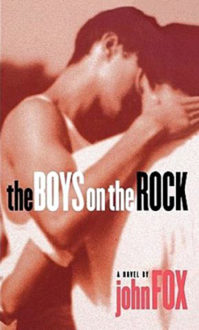 The Boys on the Rock
The Boys on the Rock
by John Fox
Published by St. Martin’s Press
Published June 1984
Fiction (youth romance)
146 pgs. • Find on Amazon.com
Reviewed by Stephen O. Murray
November 7, 2003.
The Boys on the Rock feels like an autobiographical coming-out novel.
Its author, John Fox, was born in 1952, and would have been a sixteen-year-old high-school sophomore like Billy Connors, the novel’s narrator, during the “children’s crusade” for Eugene McCarthy in 1968. Billy works in a very inhospitable Bronx district for the McCarthy campaign and has his first love, sexual breakthrough, and ultimate disappointment in a relationship with a college sophomore also volunteering in the McCarthy campaign, Al DiCicco. Al is more sexually experienced and considerably less idealistic in politics and in sexual politics. Billy still has to deal with high-school leering and hazing but does not share Al’s desire to conform in order to “get ahead” (that leads Al to a paying gig with the Humphrey campaign and being an alternate delegate to the Chicago convention for the would-be first Italian-American president, he is also adamant about not get fucked, and is mentally preparing to secure a wife as a necessary accessory for his career).
Billy’s parents absolutely don’t want to talk about sex. His mother’s sister sees that he is gay and provides him support (and, what is especially hard for young gay people still living at home to find, a place to get it on with the man he loves). At the outset, Billy finds sex with female peers completely unexciting, whereas he is very excited anticipating being alone with Al.
There is an arbitrary death (not apparently related to homophobia) near the end, and the boys are only on a rock in a dream. But Billy has an engagingly candid, sometimes self-deprecating voice, and Fox draws subsidiary characters deftly, while recalling the campaign in which I came of age (albeit without any sexual payoff!). It would seem a promising debut, but Fox died of AIDS before writing another. I don’t see the book as “the gay Catcher in the Rye.” Billy is less a poseur than Holden and caricatures his own phoniness, not just that of others. The narrative voice is engaging and the book recaptures the political turmoil of the summer of 1968 when some of us thought we could stop one of the U.S.’s ill-thought-out military adventures.
first published by epinions, 7 November 2003
©2003, 2017, Stephen O. Murray

